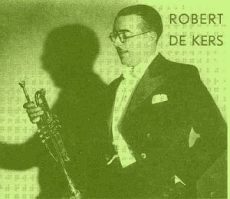
Daily Dose Of Jazz…
Robert De Kers was born Robert De Keersmaeker on August 10, 1906 in Antwerp, Belgium. He learned to play piano as a child, and began playing jazz with local musicians while in his teens. He was the pianist for the Bing Boys in 1924-1925, then picked up trumpet.
As a trumpeter Robert toured Italy with the Jeff Candrix Band, brother of Fud Candrix, and played there with Carlo Benzi and David Bee’s Red Beans. Later in the 1920s he was associated with Harry Flemming and Josephine Baker.
The 1930s saw him working with Jean Robert and Jean Omer in addition to leading his own ensemble, the Cabaret Kings, which toured Europe. He continued recording into the 1950s, also working as an arranger and composer; he led bands in the United States, and Germany following World War II and was later head of the Wurlitzer Company’s Belgian operations.
Trumpeter and bandleader Robert De Kers died on January 16, 1987 in Brussels, Belgium.
More Posts: bandleader,instrumental,jazz,music,trumpet

Daily Dose Of Jazz…
Peter Packay was born Pierre Paquet on August 8, 1904 in Brussels, Belgium and lived with his family in China for part of his childhood, but returned to Belgium in 1912. As a teenager he was crippled in one arm by an accident, but decided to learn to play trumpet anyway at age 20, joining the Varsity Ramblers.
He co-founded a band called Red Beans with David Bee and served as its principal composer of originals. Bee left the group and was replaced by Robert De Kers, and Packay remained its leader until its dissolution in 1929. In the 1930s he formed another group, Packay’s Swing Academy, which played with Coleman Hawkins among others. He also did arrangements for bandleader Billy Arnold.
As a composer, Packay’s works included Alabama Mamma, The Blue Duke, Dixie Melody, and Lullaby for a Mexican Alligator. Following World War II he gave up performance to concentrate on composition and arrangement for songs like Jazz in the Rain, One Day and Grey Skys.
Trumpeter, arranger, and composer Peter Packay died on December 26, 1965 in Westende, Flanders, Belgium.
More Posts: bandleader,history,instrumental,jazz,music,trumpet

Requisites
Donald Byrd at The Half Note Café, Volume 2 | By Eddie Carter
I enjoyed listening to the first set of Donald Byrd at The Half Note Café so much that I decided to hear the second set as well, which inspired this morning’s discussion. So, as the quintet makes their way back to the stage, let’s all sit back in our seats to enjoy Donald Byrd at The Half Note Café, Volume 2 (Blue Note BLP 4061/BST 84061). Donald Byrd is on trumpet, Pepper Adams is on baritone sax, Duke Pearson is on piano, Laymon Jackson is on bass, and Lex Humphries is on the drums. My copy is the King Record Company Japanese Stereo reissue (Blue Note BST 84061 – GYK-8105).
The rhythm section lays the foundation to begin Jeannine by Duke Pearson with their introduction ahead of the front line’s opening chorus. Donald lights the first solo like a shining beacon. Pepper succeeds him with a briskly exciting performance; then Duke keeps your foot tapping with swinging precision ahead of the ensemble’s closing chorus and trio ending softly. The leader then introduces the group’s theme, Pure D. Funk, before leading the trio through the bluesy theme. Pepper is up first with a relaxing interpretation. Duke has a very fine spot next, and then Donald is as smooth as Tennessee Whiskey preceding the group’s reprise and climax.
Side Two starts with Lex’s percussive introduction to the quintet’s medium melody of Donald’s second tune, Kimyas. Pepper swings easily in an impressive opening statement. Donald follows with another equally blissful gem. Duke completes the solos at a leisurely pace anchored by Laymon and Lex until the quintet’s ending theme. When Sonny Gets Blue by Marvin Fisher and Jack Segal opens with the front line delivering a very pretty opening chorus. Duke gets the song’s only solo and delivers a wonderful expression of incredible beauty and solace, leading to the quintet’s theme restatement. Donald ends the evening by thanking the crowd for being a receptive audience.
Alfred Lion produced this live date, and Rudy Van Gelder was the recording engineer. The sound quality possesses a top-notch soundstage that truly makes you feel like you’re right there in the Half Note Café audience. King Record Company has beautifully remastered the original mono tapes, enhancing the experience. If you’re new to the music of Donald Byrd or only know of his later ’70s jazz-funk releases, I invite you to check out Donald Byrd at The Half Note Café, Volume 2, on your next record hunt. Like its companion, Volume 1, the musicians are wonderful. The music has stood the test of time and both albums are excellent documents of a live jazz performance the listener can revisit anytime!

More Posts: choice,classic,collectible,collector,history,instrumental,jazz,music,trumpet

JON BAUER QUARTET
Jonathan Bauer is a multi-talented trumpeter, singer and composer, most notably of the Grammy award-winning New Orleans Jazz Orchestra. In 2019, he burst onto the scene with his highly acclaimed debut album, “Walk Don’t Run.” Jonathan returns with his sophomore release, “Sings and Plays”, introducing him self to the world as part of the rich lineage of trumpeters who front their bands as singers.
An internationally recognized and touring artist, Jonathan is widely celebrated for his dark and buttery sound. While earning his Master’s at the University of New Orleans, Jonathan quickly became arising talent in one of the world’s most important musical communities. He has had the opportunity to study and perform with living legends Nicholas Payton, Robert Glasper, Ellis Marsalis and Wendell Brunious among others. A versatile musician, Jonathan enthusiastically crosses genres performing with R&B titans, such as Sheila E., Ledisi, and Eric Benét.
More Posts: adventure,bandleader,club,genius,jazz,music,preserving,trumpet

MIKE VAX QUINTET FEATURING DENNIS ROWLAND
Mike Vax played with Art Pepper, Freddie Hubbard, Clark Terry, and the Glen Miller and Jimmy Dorsey Orchestras. But he is acclaimed as the first trumpet and co-leader of the historic “ahead of its time” Stan Kenton Orchestra and the ongoing Stan Kenton Alumni Band.
Dennis Rowland was the vocalist with the original Count Basie Orchestra for the from 1977 to until the Count’s passing in 1983, after which Dennis has had an illustrious solo career that included tours in Russia and several albums as a Concord Jazz Recording Artist.
Mike Vax-trumpet, Tony Vacca-sax/flute, Joel Robin-piano, Howard Alden-guitar, Selwyn Reams-bass, Van Katz-drums, with Dennis Rowland-vocals
More Posts: adventure,bandleader,club,genius,jazz,music,preserving,travel,trumpet,vocal


